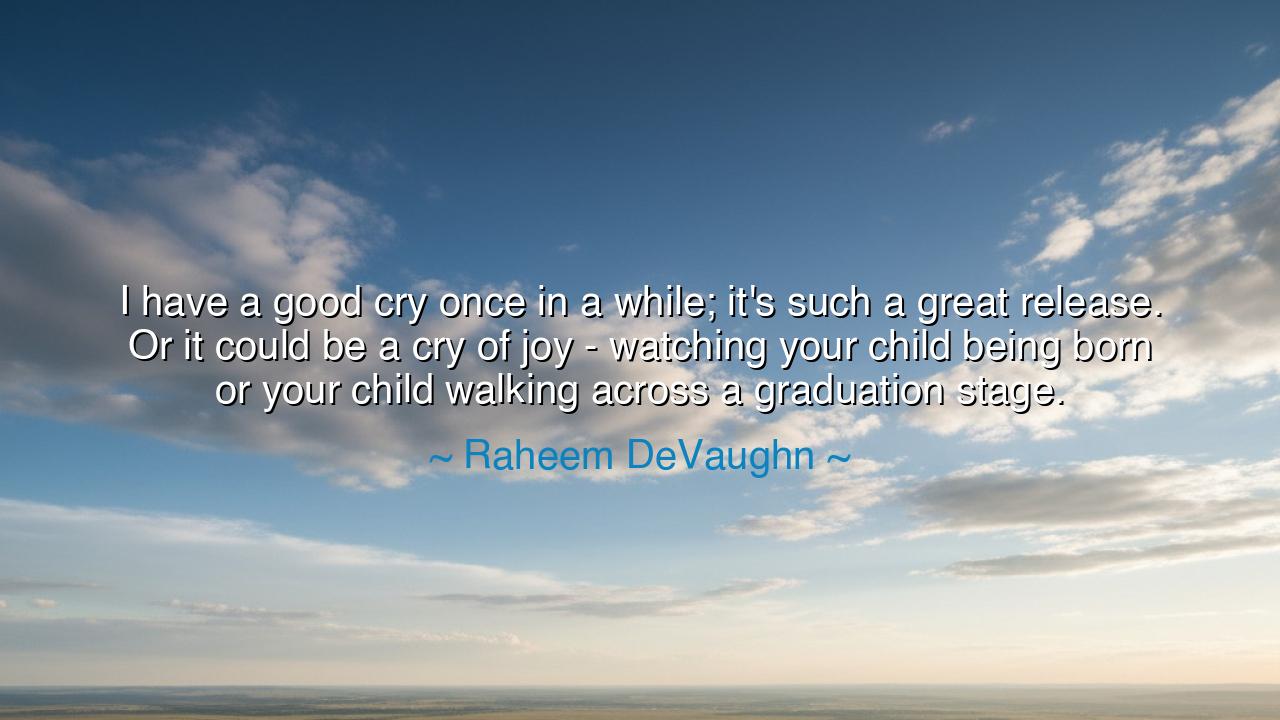
I have a good cry once in a while; it's such a great release. Or
I have a good cry once in a while; it's such a great release. Or it could be a cry of joy - watching your child being born or your child walking across a graduation stage.






“I have a good cry once in a while; it’s such a great release. Or it could be a cry of joy — watching your child being born or your child walking across a graduation stage.” Thus spoke Raheem DeVaughn, a singer of soul and spirit, whose words carry the depth of feeling that flows from a heart open to life. In this confession of tears, he reveals a profound and ancient truth — that emotion, when embraced rather than suppressed, becomes not weakness but wisdom, not sorrow but renewal. To cry is to cleanse the soul, to let the river of feeling carry away what the mind cannot bear alone. His words remind us that to be truly alive is to feel deeply, and to feel deeply is to allow the heart its release.
In these words, DeVaughn speaks as one who has lived and seen the cycles of joy and sorrow. When he speaks of a “good cry,” he does not speak of despair, but of healing — the sacred act of surrender. For there are tears that come not from pain, but from gratitude, from awe, from the simple miracle of being human. When he speaks of tears shed at the birth of a child or the graduation of one’s offspring, he speaks of the moments that remind us how fragile and beautiful life truly is. These are the tears of love — the highest, most transformative kind.
The ancients, too, understood this sacred power of tears. The Greek poet Homer, in his epics, never portrayed tears as shameful; even mighty warriors like Odysseus wept openly. For in their weeping, they revealed their humanity, their connection to life, loss, and longing. The Japanese samurai, too, were taught that one who cannot cry cannot truly honor what he protects. To cry is to honor the truth — the joy, the pain, the gratitude — that words cannot express. Raheem DeVaughn’s wisdom thus bridges the ancient and the modern: he reminds us that tears are not the end of strength, but its purification.
In the example of his words, one can see the story of countless parents — of the mother who weeps silently at the sight of her newborn’s first breath, of the father who cries as his child steps across the graduation stage, the culmination of years of care, sacrifice, and love. These are not the tears of sadness, but of fulfillment — the overflowing of the heart when it beholds the fruit of its labor. They are the tears of life completing its circles, of love returning to itself. Such tears are a language of the soul that transcends speech; they say what even joy itself cannot.
There is, too, in DeVaughn’s reflection, a lesson about the courage to feel. Modern life often teaches men and women alike to hide their tears, to wear strength as a mask. Yet this denial of emotion only builds walls within the self. To cry — truly cry — is to break those walls and return to wholeness. The philosopher Seneca, though a Stoic, once wrote that tears need not contradict strength, for the strongest souls are those who know both restraint and release. The river that is dammed too long will one day burst its banks. So too, the heart that never weeps risks breaking under the weight of unspoken sorrow.
In another sense, Raheem DeVaughn’s words are also an ode to gratitude — for tears remind us of what matters most. To cry when a child is born is to witness creation itself; to cry when that same child graduates is to witness time’s passage, the turning of life’s wheel. These tears are reminders of how fleeting, and yet how sacred, our connections are. They are the body’s way of bowing before life’s mystery — saying, “I am here. I have loved. I have seen beauty and felt its cost.”
So, dear listener, take this teaching into your heart: do not fear your tears. Let them fall as offerings to life’s altar. Weep for joy when joy overwhelms you, weep for sorrow when grief demands it, and weep in gratitude for the privilege of feeling at all. The heart that can cry is the heart that can heal; the soul that can release is the soul that can renew. Remember that even the rain must fall before the earth can bloom.
Practical actions for the seeker: When emotion stirs within you, do not bury it in silence —






AAdministratorAdministrator
Welcome, honored guests. Please leave a comment, we will respond soon